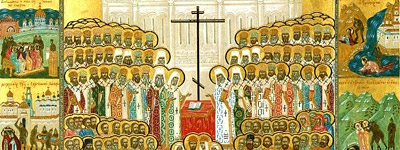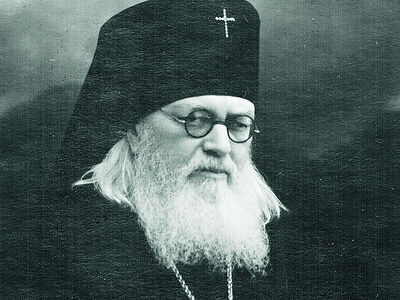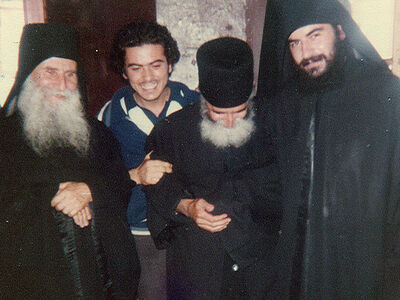 The Church is Built on the Blood of MartyrsWhen the time of persecution, sorrows, and illness comes, a person mobilizes and realizes that earthly life is a special space, that it is not a health resort or a sanatorium. There is little point in seeking pleasures and pleasant sensations—that is the greatest illusion.
The Church is Built on the Blood of MartyrsWhen the time of persecution, sorrows, and illness comes, a person mobilizes and realizes that earthly life is a special space, that it is not a health resort or a sanatorium. There is little point in seeking pleasures and pleasant sensations—that is the greatest illusion.
“>Part 1: The Church is Built on the Blood of Martyrs
 Dionysius. The “Descent into Hell” Icon, 1502 —One man decided to have a health check-up (this is a real first-hand story from his wife). As a result, it was concluded that he was perfectly healthy. However, once the man had left the last doctor’s room, he had a heart attack on the threshold and died right there.
Dionysius. The “Descent into Hell” Icon, 1502 —One man decided to have a health check-up (this is a real first-hand story from his wife). As a result, it was concluded that he was perfectly healthy. However, once the man had left the last doctor’s room, he had a heart attack on the threshold and died right there.
—Actually, there are plenty of such stories. God alone gives guarantees. No matter what sins a person has committed, if he repents sincerely, they will be forgiven. How long will he live after that? How happy, comfortable, and rich will he be? How many healthy and joyful children will he have? Will there be a war? No one guarantees such things. The Lord gives one guarantee, which relates to eternity and our personal salvation. The Lord did not promise social, political, and economic reorganization. We see this even in the New Testament. But if you want to be transformed, to belong to Christ, to enter into a relationship with God and inherit the Heavenly Kingdom, then prepare your soul for  The Greatest Temptation for Orthodox ChristiansI would say, probably, the main temptation faced by the Orthodox Christians in the West in modernity in general is double-mindedness.
The Greatest Temptation for Orthodox ChristiansI would say, probably, the main temptation faced by the Orthodox Christians in the West in modernity in general is double-mindedness.
“>temptations. Then everything will be fine.
—It seems to me that the  New Martyrs and Confessors of Russia
New Martyrs and Confessors of Russia
“>New Martyrs of Russia are holy beacons in the thickening darkness of our times. What can we learn from them?
—I think—and this is my personal opinion about the host of the New Martyrs of the twentieth century—that, first and foremost, we can learn from them the spirit of victory and nonconformism. Conformism is becoming the cornerstone of our lives. And the art of negotiating, compromising your inner positions and beliefs, turning spiritual and cultural heritage into a marketable commodity has become commonplace. This is really a huge problem.
But a saint is a nonconformist who does not agree to any concessions; on the contrary, he is ready to shrink his living spaces, he is ready to enter into the storm of an ascetic situation, and he is even ready to see himself as something that needs to be overcome only in order to get closer to Christ and the grace of God. That is, to find the place of perfection in which the grace of the Lord will find him, because the grace of God is not what a person finds, but what finds a person. Christ says: Ye have not chosen Me, but I have chosen you (Jn. 15:16). But for this you must have a specific order of the mind and of heart—to be in a place and a time where it is more convenient for the grace of God to find you. Not only to be found, but also to agree with the fact that you have been found, and to realize that there are no personal merits of yours here. It is not easy to accept another’s love, or even Divine love. Pride, restraint, and self-will are serious obstacles. As a rule, it is easier when you yourself love someone; it is according to your will and your patterns. To “show great favor” to another by your primitive appearance, to impose your version of love on someone else against his will is easier, perhaps because you are its author.
And if your feeling is not reciprocated, you experience micro-dramas, which you use to justify yourself and sometimes admire yourself.
And the ability to accept someone else’s love, to be loved, means to come to terms with reality—not only human, but also Divine. This makes us humans, who are finally able to accept Divine gifts.

—Children are another matter. They don’t always accept stories about martyrs. When my godson’s mother read him the Lives of the Saints before going to bed, he asked her, “Don’t read to me about martyrs—it scares me.” This is understandable: a child’s soul is like an angel’s, and it expects grace and harmony from life; it is difficult for it to accept the evil of this world. How can we tell children about bearing the cross and martyrdom? Or should this theme be avoided altogether until a certain age?
—A child’s angelic soul accepts the victory over the evil of this world, not the evil of this world itself. If we look at the New Testament, we will see suffering, humiliations, flagellation of the Savior Himself, and His death on the Cross. Isn’t that even more scary? Based on this logic, should we not read the Gospel to children? But we know that we are talking about something else: the victory over evil, death and hell. If we don’t see it, we can hardly show it to our children. But we, Orthodox Christians, must necessarily talk about martyrs, the real witnesses and co-partakers of the God-Man Christ.
If we don’t tell children anything about martyrs, then, accordingly, we shouldn’t tell them anything about heroes. All fairy tales have a hero. He defeats Koshchei the Immortal,1 Baba Yaga,2 and these are very uncomfortable things. He kills a dragon and saves a princess, or a queen, or a beautiful young lady. But why bother? Are there no other girls in the world? Why get into such a conflict with a dragon? After all, you can be killed. And why dirty your hands with dragon’s blood? Of course, a dragon does not look like a noble hero: scaly and evil, with smoke and fire coming out of its mouth. But if you look at it from the perspective of the Greens, a dragon is a living creature with its own rights and offspring, who need to be fed on the flesh of innocent maidens. Here is an educational subject to talk about with children: Why are we on the side of the hero, and not the dragon? Why, for example, do we love Great-Martyr George, and not the serpent?
I believe that we can talk with children about everything, including the suffering, pain and great tragedies of this life. But if you tell children about everything in the light of the Gospel truth and Patristic Tradition, with love and faith, they will perceive the reality of this world correctly. They should understand that everything will end in victory. And if you take victory out of the context of the lives of martyrs—victory in spirit, by grace, for Christ’s sake, in Christ, the victory of Christ Himself over hell—then what remains? Only meaningless suffering. Strictly speaking, Christian martyrs enter into the victory of Christ. Christ has already overcome the world, and He will not come to overcome it a second time. He has already conquered hell and death, and we just need to enter into His victory—that is, combine our faith, hope and efforts with the victory of Christ. This is an absolutely different story. Here something great and Divine appears in the child’s soul. The vulgar and philistine will go, and everything selfish dissolves.

I think that we can talk with children about  On the Struggle with the PassionsIn order to overcome all the passions without exception, it is necessary to learn abstinence.
On the Struggle with the PassionsIn order to overcome all the passions without exception, it is necessary to learn abstinence.
“>passions and their destructive power. A girl or a boy grows up, sees alcoholism, drug addiction, lechery, and much more. It is clear that the child will learn about all this sooner or later. But children must learn it from their loving parents or father-confessors, not from nasty and toxic people. It seems to me that we must explain to children: Here are drugs and their fleeting pleasure, followed by unbearable suffering and terrible irreversibility. It is very important to show them how everything looks, and cultivate other priorities for our children: All things are lawful unto me, but all things are not expedient (1 Cor. 6:12). Take lechery, for example. A young girl goes fishing for a husband in a football team from the first to the last. She gets acquainted with all of them, but her “research” is bound up with a loss of mental integrity and chastity. She acquires knowledge of sin and passions, but at the same time loses life itself: not only the earthly, but also the eternal. So, the number of sins known is proportional to the loss of life. It can hardly be called a gain.…
Refusal always returns with rewards. Even a very quiet “no” in this world has a sacred and very valuable meaning when we say “no” to sin, lies, lust, and substitution. And we know that the demons of lies and substitution are now at work and very successful. When we say “no”, we feel the boundary: Here is me, and there is something external and different—outer darkness, forces filled with evil, untruth, deceit, and the like. We learn to fight for our souls, for our inner space, for our Orthodox Christian faith. And if a child’s parents don’t teach him this, who will?
And the experience of a martyr says that if an external evil is coming, evil thoughts are beginning to attack from inside, your neighbors appear to be very “distant”, and you are betrayed and sold, you understand that there is something that you cannot betray—and a hero appears in literature—but most importantly, a Christian, a martyr appears.
“I won’t take a single step back. Amen. I’m a Christian, I belong to Christ, and I have been born twice: the first time by flesh and blood, and the second time by water and the Spirit. But I put on Christ and became a little Christ when the priest sang: ‘As many of you as were baptized into Christ have put on Christ...’3 I will not take off these robes of Christ and will not cease to belong to Christ. Even if I have to lose my freedom, shed blood, and even die.” And this is joy. Why? Because if you see nothing but defeat in your defeat, then there is nothing but defeat in it. And if you see victory in your defeat, then, of course, there is victory. Remember that eternal life has shone forth from the Tomb: from a place of decay where absolutely everyone died. However, the Life-giving Tomb of Christ is before our eyes. And Christ trampled down death by death. If we see victory over what is mortal, terrible and bad in us, there is victory there. If you manage to explain and show it to your child, you have already given birth to him to live a full-fledged Christian life in this world. It is not enough just to give birth to a baby; a Christian must be born in this child so that his mind, his heart and soul can be ripe for understanding these fundamental Christian truths. And everything stable, authentic and harmonious in his soul depends on it. Your child will understand that he is in a great tradition and continuity, and that the merciful Lord and Lover of mankind is above him, as He is above all people.
The ability to tell a child about the truths of faith is sometimes a very difficult catechism exam for parents. If parents cannot string two words together, this is their big problem. In the words of the Apostle Peter, Be ready always to give an answer to every man that asketh you a reason of the hope that is in you with (1 Pet. 3:15)—not the least to your children.

—There is also the concept of “bloodless martyrdom”. What does it tell us?
—That every Christian who wants to live in Christ will have sorrows in this world. But Christ says, Be of good cheer; I have overcome the world (Jn. 16:33). If you want to live with a Christian conscience, you come into conflict with many prejudices, superstitions, pseudo-political, social and cultural phantoms, and follies. And these collisions can be very sharp and painful. Once you declare who you are, the enemy says: “If you are such, you won’t be here now.” He begins to test your strength, and real life begins. No one will bother you as long as you don’t exist.
— “My First Meeting with Elder Paisios”He told me, “You are related to us.” I said to him, “Geronda, are you from Cyprus?” He replied, “You’re slow-witted.”
“My First Meeting with Elder Paisios”He told me, “You are related to us.” I said to him, “Geronda, are you from Cyprus?” He replied, “You’re slow-witted.”
“>Elder Paisios the Hagiorite struck me with his words, written in the second volume of his works, that the sacrifice in war of people who did not believe in eternal life “has greater value than the one made by those who believe… The non-believers did not know that the sacrifice they resolved to make was not in vain, that they would be rewarded for it in the afterlife.” And those who sacrifice their lives to defend their neighbor imitate Christ. “Because they despise death out of love and thus acquire immortality, finding the key to eternity under their tombstone and easily entering eternal blessedness.” Does this mean that soldiers who die on the battlefield are martyrs?
—There are these words of Christ: Greater love hath no man than this, that a man lay down his life for his friends (Jn. 15:13). The ability to pay the highest price possible—your life, out of love for another—has always been highly valued in the Orthodox Church. As St. Paisios the Hagiorite notes, if someone consciously believes in God, this makes his sacrificial path easier. Still, it is better to be conscious, to see, and understand. If you don’t see, don’t understand and don’t feel, but do it, anyway then it’s much harder. If we take the Second World War, we saw a huge number of people who performed an obviously Christian feat. They laid down their lives for their fathers’ graves, for their wives and children, and for their way of life. And it was nothing other than a sacrifice. The degree of their awareness varied, but there is no doubt that their sacrifice had a sacred content. Those people did not go out to kill, but rather to die for what they held sacred, without which anything that comes afterwards has no meaning or justification.